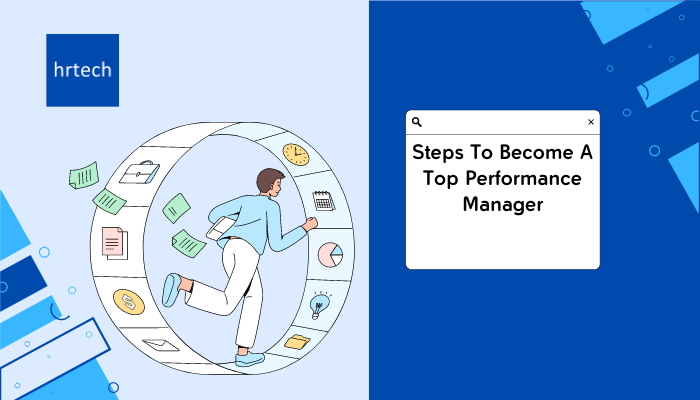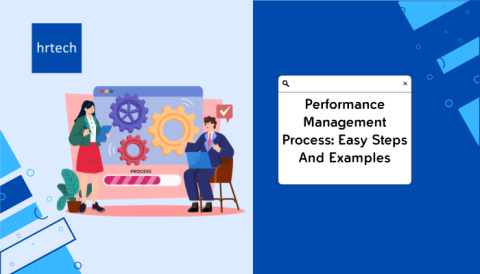Interested in helping employees reach their full potential? Want to play a key role for organizational success?
Then, a career as a performance manager might be the perfect fit for you.
In this guide, we’ll explore what performance management is, what a performance manager does, and how you can become one, step-by-step. We’ll also explore the salary and benefits you can expect in this role.
What Is Performance Management?
Performance management is the process of setting goals, monitoring progress, and providing feedback to help employees improve their performance.
It’s a continuous cycle that involves:
- Setting clear expectations
- Providing regular feedback and coaching
- Evaluating performance and identifying areas for improvement
- Recognizing and rewarding good performance
Effective performance management helps employees understand what’s expected of them and how their work contributes to the organization’s success.
It also helps managers identify high performers and areas where employees need additional support or development.
The Role Of A Performance Manager
A performance manager is responsible for overseeing the performance management process within an organization. They work closely with employees and managers to ensure that everyone is aligned with the company’s goals and objectives.
To be successful in this role, you’ll need strong leadership and communication skills. You’ll also need to be analytical and able to interpret data to make informed decisions.
Emotional intelligence and empathy are also important, as you’ll be working closely with employees and helping them navigate challenges.
What Does A Performance Manager Do?
A performance manager’s day-to-day tasks and activities can vary depending on the organization and industry. However, some common responsibilities include:
- Collaborating with HR and senior management to develop performance management strategies.
- Setting goals for employees and teams.
- Tracking and analyzing performance data.
- Conducting regular check-ins and feedback sessions with employees.
- Preparing and delivering staff performance reviews and appraisals.
- Identifying and resolving performance issues.
- Providing coaching and guidance to help employees improve.
- Recognizing and rewarding good performance.
- Developing and implementing training and development programs.
Performance managers also play a key role in building a positive work environment and promoting employee engagement.
Related Read: 11 Best Software For Effective Performance Management
Performance Manager Salary
The salary for a performance manager can vary depending on factors such as industry, location, and experience.
On average, the average base pay for a performance manager role ranges between $78,000 and $180,000.
In addition to salary, performance managers may also receive benefits such as:
- Health, dental, and vision insurance
- 401(k) or other retirement plans
- Paid time off and vacation days
- Professional development opportunities
- Bonuses or incentive pay based on performance
How To Become A Performance Manager?
Step 1: Earn A Bachelor’s Degree
The first step to becoming a performance manager is to earn a bachelor’s degree in a related field such as business administration, human resources management, psychology, or organizational development.
These programs provide a strong foundation in HR topics like management principles, organizational behavior, and employee development, which are essential for success in a performance management role.
For example, a degree in business administration with a focus in human resources management can provide you with a strong understanding of HR practices, including performance management.
You’ll learn about topics like employee relations, training and development, compensation and benefits, and employment regulations.
Step 2: Gain Relevant Work Experience
Once you have your degree, the next step is to gain relevant work experience.
Employers typically look for candidates with experience in human resources, management, or a related field. There are a few ways you can gain this experience:
- Start in an entry-level HR position. Look for positions such as HR assistant, HR coordinator, or HR generalist. These roles will give you a broad understanding of HR functions and exposure to performance management processes. For example, in an HR coordinator role, you may assist with tasks like administering performance reviews, setting employee goals, and tracking performance metrics.
- Take on leadership roles in your current department. If you’re already working in a non-HR role, seek out opportunities to manage projects, train new hires, or mentor junior employees. This can help you develop valuable leadership and coaching skills that are essential for success as a performance manager.
- Volunteer for cross-functional projects. Look for opportunities to work on projects that involve collaboration with other departments, such as marketing or finance. This can help you gain a better understanding of how performance management fits into the broader organizational strategy and how to align employee goals with business objectives.
Step 3: Develop Key Skills
To be successful as a performance manager, there are several essential skills you’ll need to develop:
- Communication – Performance managers need to be able to clearly communicate expectations, provide feedback, and have difficult conversations when necessary. This requires strong verbal and written communication skills, as well as the ability to listen actively and adapt your communication style to different audiences.
- Coaching – A big part of a performance manager’s job is providing guidance and support to help employees develop and improve. This requires the ability to ask probing questions, provide constructive feedback, and help employees identify areas for growth and development.
- Data analysis – Performance managers need to be able to track and analyze performance data to identify trends, spot issues, and make informed decisions. This requires proficiency in tools like Excel, as well as the ability to interpret and draw insights from data.
- Problem-solving – Performance issues can be complex and multifaceted, so performance managers need to be skilled problem-solvers. This involves the ability to diagnose root causes, generate creative solutions, and work collaboratively with employees and other stakeholders to implement changes.
Step 4: Consider Pursuing Certifications
While not always required, pursuing relevant certifications can help you stand out to employers and demonstrate your expertise in performance management. Some popular certifications include:
- SHRM Certified Professional (SHRM-CP) – This certification, offered by the Society for Human Resource Management, demonstrates your mastery of key HR competencies, including performance management.
- Certified Performance Management Professional (CPMP) – This certification, offered by the International Society for Performance Improvement, covers topics like performance analysis, intervention selection and design, and evaluation.
- Certified Human Resources Professional (CHRP) – This certification, offered by the HR Certification Institute, covers a broad range of HR topics, including performance management.
To earn these certifications, you’ll typically need to meet certain education and experience requirements and pass an exam.
Step 5: Network And Apply For Jobs
Finally, as you gain education and experience, start networking and applying for performance manager positions. Attend industry events, join professional associations, and connect with other HR professionals to learn about job openings and get advice on your job search.
When applying for jobs, customize your resume and cover letter to highlight your relevant skills and experience. In your cover letter, be sure to emphasize your passion for helping employees succeed and your track record of driving performance improvements.
Final Thoughts
Becoming a performance manager can be a rewarding career path for those who are passionate about helping employees and organizations succeed. As you develop key skills, gain relevant experience, and stay updated on best practices, you can prepare yourself for success in this role.
Effective performance management is an ongoing process that requires continuous learning and improvement.
Want to enhance your career in HR? Explore top courses and training programs at hrtech to get updated with the most in-demand HR skills.





